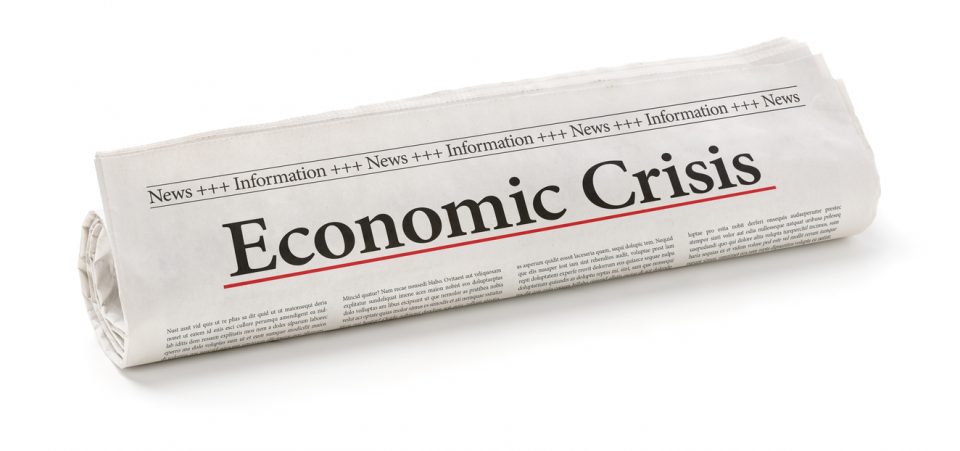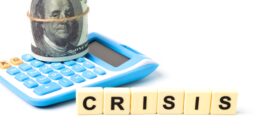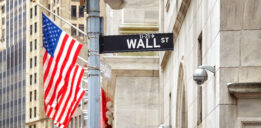Trump Is Trapped Between His Political Base and a Stock Market Crash
A stock market crash seems inevitable now.
There are domestic and international triggers lurking beneath every bullish move on Wall Street. Often these risks intertwine, which muddles investors’ ability to read market trends.
The latest Apple Inc. (NASDAQ:AAPL) quarter represents one of those risks. At first glance, Apple has delivered one of the best second-quarter results in the history of the Cupertino, California-based company.
There are, however, some disconcerting aspects of the results that should worry investors.
What has this got to do with a stock market crash though?
Tax Cuts Are Being Used for Buybacks, Not Investment in Growth
Apple owes a great deal of its great success to President Donald Trump’s tax cuts. Even CEO Tim Cook, not exactly what one might call a Trump voter, conceded that Apple owes some of its recent success to the corporate tax cuts passed in December 2017.
Cook, during Apple’s investors’ conference call, stressed that President Trump’s tax reform was an important factor, contributing to the result. The Apple boss said some platitudes about the company being able to execute its plans more efficiently. But when he went into more detail, this “efficiency” consisted of a repurchase of shares. (Source: “Apple Reports Second Quarter Results,” Apple Inc., May 1, 2018.)
Cook announced a $100.0-billion stock buyback program, in fact. Naturally, Apple also increased its dividend.
But the key performance contributor, given the sluggish “iPhone” sales, is the tax break that made the great earnings possible. Without the tax break and the buybacks, Apple stock would not have reached its highest valuation of 2018.
The tax breaks will not be used to create more jobs in the United States.
Apple’s actions are perhaps the most visible example of the parasitical way corporations are exploiting the tax cuts. There’s no trickling down of wealth happening.
Tax Cuts Are a Temporary Patch
The investor class keeps getting richer. But, sooner or later, the rubber band that is the economy will have been stretched to the limit and break.
The tax cuts have simply put a temporary patch on the dire situation that looms over Wall Street.
Apple may yet manage to restore investors’ trust in the all-important tech sector. But it’s a tough task. Institutional investors have pulled $40.0 billion from the markets in a matter of weeks. (Source: “Investors pulled a ‘remarkable’ $40 billion from U.S. stocks since mid-March,” Yahoo! Finance, April 4, 2018.)
The detonator may have been the Cambridge Analytica scandal involving Facebook, Inc. (NASDAQ:FB). Cambridge Analytica has now folded, unable to cope with the weight of the lawsuits and the negative fallout.
The readiness with which investors have moved away from Wall Street and into Treasuries sends a clear warning of an impending stock market crash.
Bond yields are increasing and, despite the risks, the trend suggests that this will continue.
Apple’s fiscal break-induced quarterly performance does not make up for the fact that investors are becoming more risk-averse. If the Trump tax plan last December inspired equity investors until January, it was not enough to make up for the volatility.
Trump can take credit for his tax cuts, which do precious little for ordinary Americans and the real economy. But he must also accept the blame for the confusion that has Wall Street worrying that a stock market crash could strike at any moment.
In effect, Trump has delayed the inevitable stock market crash. That was the purpose of the tax cuts being passed just before Christmas of last year. The tariff and trade threats against China and the European Union (EU) represent the other distraction.
Trump Wants to Push Back the Risk of a Stock Market Crash Until After the Midterm Elections
There’s no denying Trump’s skill as a deal negotiator in business. A year-and-a-half into his presidency, Trump has shown this skill—for better or worse. The real estate tycoon and television entertainer has successfully played the same game he used to bamboozle Merv Griffin in an Atlantic City hotel-casino deal in 1988.
Trump played tough, claiming that he’d never sell his controlling stake in the company to Griffin. Yet, at the end of a bitter negotiation, which looked like a heated argument, Trump walked out with a $400.0-million profit, which was a lot of money at the time. (Source: “Griffin Wins Resorts In Deal With Trump,” The New York Times, April 15, 1988.)
But will Trump’s Machiavellian games play out well against the Chinese, who presumably play Sun Tzu’s game?
The escalation of the tariff rhetoric between the U.S. and China—and the EU—has come in waves. But the stakes that Trump has put on the table are dangerous.
Trump is pushing the Chinese and Europeans to propose a truce. He wants them to propose a compromise. Therefore, he has raised the odds.
Tariffs Hurt Americans More
The risk to Americans comes from the fact that new tariffs would hurt American consumers first and foremost, whether they’re buying Chinese-made clothes and electronics or European wines and cars.
Trump has decided to play the match now. He wants to have a few things to show the Republican base ahead of the midterm elections. But stocks will crash if the president loses his gamble.
Trump was supposed to announce aluminum tariffs against Canada and Europe on May 2. But he postponed the move until June 1. In private, Trump is likely trying to reach a compromise deal.
What form this compromise might take is anyone’s guess. Yet, it may possibly include a willingness for Europe to lift, even partially, its restrictions or bans on certain American food products.
Nobody wants a trade war, and that includes Trump. But he must appear tough to his voter base in order to strengthen the GOP in time for November’s election showdown.
Trump has purposely aimed high. He wants to impose a 25% tariff on steel and a 10% tariff on aluminum. These are essential metals, often needing sophisticated metallurgical processes, for the aerospace and automobile industry. Indeed, cars use much more aluminum now than ever before, to cut emissions and save fuel.
The Europeans, for their part, have returned Trump’s fiery rhetoric. They have much to lose, and they know it. Without the American market, many European luxury goods makers, including car manufacturers, would have to cut production significantly.
The Europeans have the most to lose in this respect. That’s their incentive for coming to the table—even if they feel they are being blackmailed.
Appealing to the Base Has Its Risks
In a strange way, the Damocles sword of “Russiagate,” which hangs over Trump’s presidential future, has forced him to honor his campaign promises. More than other presidents, Trump has kept them—except in foreign policy, where a different set of rules applies.
Trump has correctly tried to strengthen support among his base, even as Special Counsel Robert Mueller continues to spin his wheels in his investigation.
Trump could be asked to testify before a grand jury. Nevertheless, had Mueller found anything concrete on Trump, he would have pulled that rabbit out of his hat by now—as a former high-ranking CIA analyst thinks. (Source: “Robert Mueller: Gone Fishing,” Consortiumnews, May 1, 2018.)
The grand jury rumors, if true, are an attempt to discredit the president ahead of the midterm elections. Trump must do everything possible to uphold his 2016 electoral promises to address the aspirations of “Deep America” rather than the proverbial “Deep State.”
Therein lies the problem. If the Europeans don’t respond to Trump’s bait, the president will be forced to act against his own best business instincts.
If the deadline of June 1 arrives without any alternative approaches from Beijing and Brussels, Trump will have little choice but to enforce the tariffs. His voter base will cheer, but many investors (first) and consumers (later) will eventually suffer.
Tariffs Will Raise Inflation
Higher tariffs will mean that American consumers, who are already paying more for fuel, will have to pay a higher price for all manufactured products, which range from automobiles to housing and travel. And then there’s the real clincher: economists and the Federal Reserve will shout “inflation.”
And this won’t be the good kind of inflation that comes from economic growth. It will be the kind that makes U.S. goods less competitive because higher raw material prices will raise the costs of domestic production.
And then Trump won’t have much choice. He will either retract and look foolish, or remain his combative self and trigger a spiral of tariffs that spin the economy out of control.
How well will that play out with his base?
Oh, and note that the higher the inflation, the higher the Federal Reserve will raise interest rates. That won’t be good for investors; they will have to pull out of higher-risk equities. This scenario might be good for the gold price, but not for stocks.
There’s an unspoken fear that the tax cuts might have been a little rushed. It seems that, in the gamble that Trump has taken with tariffs, he faces the second-biggest risk. The highest risk is of a massive stock market crash.






